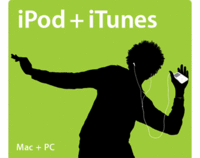Should Apple open its music format?

This question comes up fairly frequently and usually accompanies every report on the latest growth rate of the digital music market. Apple’s failure to open its operating system is widely cited as the reason it lost the personal computing market to Windows-based PCs. Given the close relationship between iTunes and iPod, many pundits wonder if Apple is in the process of making the same mistake and expecting different results.
Here’s the quandary: Apple’s proprietary music format, AAC++, is sold only on iTunes. Those files must be converted to an format such as MP3 or WAV to play on something besides iPods, which remain far and away the dominant portable music player. Aside from open formats such as MP3 and WAV, the iPod plays no other file format.
Should Apple open the iPod to accept formats from services such as Rhapsody, Napster and others? Should iTunes open its file format to non-iPod markets?
iPods account for 92.1% of market for the hard-drive-based players, according to the NPD Group. But cheaper, flash-based music players have streamed in from all corners, leaving the iPod with a 30.2% share of the overall digital music player market. Meanwhile, the number of music services has tripled in the past year to 300. Each new competitor’s entry in the market gets splashy coverage by the domestic and international business and technology media, whose hype machines have been largely dormant since the dot-com bust of 2001.
Sales of iPods are driving sales for iTunes (and vice-versa) and there’s a not-to-distant relationship between iPod/iTunes and overall sales for Macs, the market share for which grew 34.8% to 2.5% overall in Q2 of 2005. That puts Apple in eighth place behind Dell, HP, Gateway and others.
Loren Loverde, director of IDC's Worldwide PC Tracker Program, told The Mac Observer:
“It seems they are seeing some real connection between the success of their online music business and the iPod and their PC business,” he commented. “It's hard to make that statement conclusively, but just based on the publicity that they've received from the music sector and the change in growth over the last couple of quarters, which has been quiet remarkable, it seems to coincide pretty well with the visibility of the music business. I think it's safe to say that there is some element of a halo affect.”
Let’s give it a quick Michael Porter test:
- Supplier Power: Given how completely iPod dominates the hard-drive-based market and iTunes’ towering sales, it’s hard to imagine that Apple is under the thumb of either hardware or content providers, although Apple’s deal with Intel could shift some of that leverage away from Apple. The current iPods use an ARM chip from Texas Instruments, but we can expect to see Intel inside future versions of the iPod line. Content owners, particularly major labels, claim to have been mortally wounded by file-sharing and piracy and thus are violently opposed to any format that lacks digital rights management and any format that lends itself to use on multiple devices (read: copying) makes them nervous. But, if anyone has exhibited leverage over content owners, it’s been Steve Jobs.
- Barriers to Entry: Not applicable. Not only has Apple entered the digital music and music player markets, it dominates them.
- Threat of substitutes: Sky-high. I’m not positing that Apple will succumb to them, but, with 300 music services and almost as many digital music players on the market (almost all of which are cheaper than their Apple counterparts), there doesn’t seem to be much to debate here.
- Buyer power: From a wholesale perspective, Apple’s eponymous retail channel is pretty good hedge in the event that relationships with other retailers of Apple products such as HP (whoops, not anymore, according to the WSJ) and Amazon go south. The bigger risk is with consumers, who face no shortage of substitutes (see above). Aside from adding a photo component and a U2 version, Apple hasn’t really introduced features or versions that aren’t already out there. The average price of a 20-gig digital music player is being driven down by Dell, Creative and a host of new entrants. By offering the same thing as everyone else, Apple has only its sleek brand by which to justify the premium that consumers pay for iPods.
- Rivalry: In terms of brand identity for digital music, Apple has a huge lead on its rivals that completely inverts the lead those rivals enjoy on Macs. As I mentioned, there aren’t many significant feature differences between their offerings, but each competitor’s closed format represents a barrier to entry for its rivals, notwithstanding Real’s efforts to sell music that plays on iPods.
Because iTunes is married to iPod and because both dominate their respective market, it’s not as if keeping the AAC++ format closed has represented much of a missed opportunity for Apple. If you’re an iPod owner, the only thing that would make you buy music anywhere but iTunes would be a service that offers cheaper files that still play on your iPod. If you're not an iPod owner, you can still convert iTunes files to play on your device.
In the eyes of Apple and its supporters, the iPod-iTunes relationship is akin to that of razors and razorblades or printers and ink cartridges. Conventional business wisdom avers that profits can only be preserved by maintaining the symbiosis between the two.
But what if a wedge gets driven into the iPod-iTunes relationship? What iPod starts losing share? Should iTunes address markets outside of iPod owners? Such a move would certainly orphan the iPod, although it would add value to an iTunes music file for which iTunes could charge a premium. That could stave off some of the commoditization of digital music, although, by making iTunes files directly playable on other devices, the iPod would be exposed to further price pressure.
But iPods add hundreds of millions to Apple’s top line, while iTunes has only contributed millions. Until something reverses that dynamic, it would be awfully hard for Apple to justify cutting out the knees of its largest absolute source of profitability and revenue growth.
iTunes collects 29 cents on a 99-cent download and is said to have 20% gross margins and 5-7.5% operating margins. Still, iTunes’ surging sales are expected to boost those margins as fixed costs are spread across increasing volumes, while operating margins on iPods are expected to fall below 10%. I suspect they could fall further as Apple gets squeezed between the price pressure and the supplier power wielded by Intel.
In the meantime, opening the AAC++ file format would only accelerate the inevitable. Apple should wring out as much profitability as it can from the iPod until profits from iPods and iTunes reach an inflection point. Only if such a point seems imminent (and that’s a big “if”) should Apple consider opening its music format.
Opening the iPod is a different matter. Apple has repeatedly slashed prices on the device and will likely do so again. It’s tempting to think that Apple’s brand can justify a premium for the device. But that same thinking is what cost the Mac almost all of its market share 20 years ago, when Apple’s refusal to license its operating system to other PC makers allowed Windows-powered PCs to flood the corporate, consumer and education markets.
Presently, iPod’s margins are under more pressure than its market share, although there's only so much margin Apple can cede before it loses share. Still, before it capitulates to accepting the file formats of iTunes’ competitors, it must look to other features to prop up the device’s margins. What features? That’s the topic of a later post, but battery life would certainly be at or near the top of my list.
Adding features could expose the iPod to broader competition from other handheld devices. To the extent that the iPod hems itself in from such competition or finds itself unable to compete, it may be time to consider opening the device to others services’ formats.
Similarly, if competitors such as Napster-to-Go showed they could consistently take share from iTunes, the iPod could be dragged down by iTunes. Blunting such an aftershock could require Apple to open the iPod to other services, as a turnkey device that plays other services' files would have more value to consumers in that context.
Labels: business, technology








0 Comments:
Post a Comment
<< Home